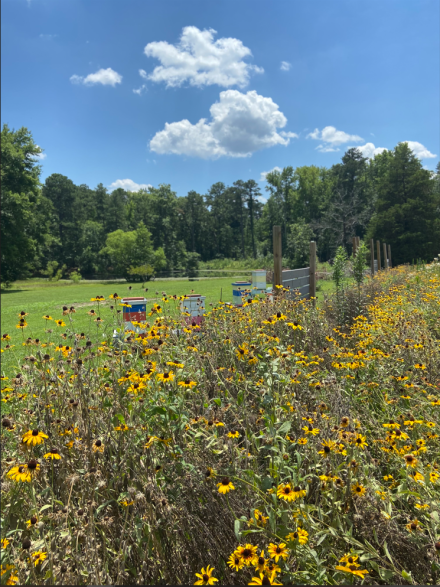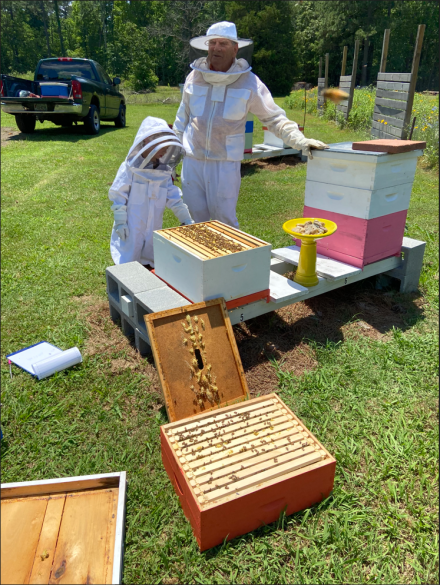by the Rev. Whitney Z. Edwards
The kingdom of God is like a hive of bees in the Virginia countryside.
Lisa Austin and her father-in-law John Austin did not set out to change the way their neighbors garden and farm. But the Holy Spirit stepped in, calling them to become stewards of creation and disciples to others.
Lisa and John live in adjacent homes amidst land in Varina that has been farmed for over 300 years. Both were raised by farmers and have taught their children that God, community, and the land are among the most important things in life. Lisa teaches Sunday school at Varina Church and John is Junior Warden. It is a rare Sunday when the pews are not filled with four generations of their family.
Several years ago, after Lisa lost her beloved father and uncle, she was stirred by childhood memories of watching them harvesting honey in rural Louisa County. She felt the pull to honor them by doing her part to help preserve the land. Lisa recognized what so many of us have seen: that the fields and forest and orchards surrounding her home were missing the bees and butterflies and the multitude of pollinators of years past. So she got a hive of bees.
“I didn’t really know what I was doing at first, but when you care enough, you learn. And I certainty did both,” Lisa said. Her first colony died, poisoned from insecticides they had unwittingly gathered while foraging for pollen. “Oh, it was devastating,” she said. “I had fallen in love with those bees and then they were gone.”
Encouraged by John, she tried again. And again. Now, several years later, four generations of the Austin family help to care for 150,000 bees spread across nine hives. John has planted 19,000 square feet of native flowers that bees love and he ensures a nearby pond has clean water for the bees to drink. Last year, the Austins produced 50 pounds of honey. This year, John manned a beekeeper’s booth at the Virginia State Fair, answering questions for people curious about beekeeping.
Neighbors are also learning from the Austins about bees’ essential role in the ecosystem. “I introduce everyone I can to the wonder of bees,” said Lisa. “And you can’t talk about bees without talking about weeds. Dandelions and other flowering plants are actually rich in nutrients for pollinating insects. Never kill them or any native plants that spring up in your yards. They are gold!”
Bees have a foraging range of several miles, so everyone, even city dwellers, can safely assume that bees are foraging in their gardens. This means that, no matter where you live, the use of insecticides and herbicides can kill a hive.
Every beekeeper can tell you a story of hive collapse. Worker bees come home, carrying pollen to feed the others, not knowing there is poison on it. They share the food with everyone and, within days, the entire hive is dead. So it’s important for everyone to learn about non-poisonous ways to garden and farm.
As with any effort that serves to restore and heal the earth, there is a spiritual aspect to bee keeping, too. “There really is truth to the old Celtic saying ‘go tell it to the bees’,” says Lisa.
There is divine wisdom in caring for these tiny creatures. “The world would be a much better place if we lived like them,” John says, “serving others for the sake of the whole and building the kingdom together.”
About the Author: The Rev. Whitney Z. Edwards is Vicar of Varina Church, Varina


